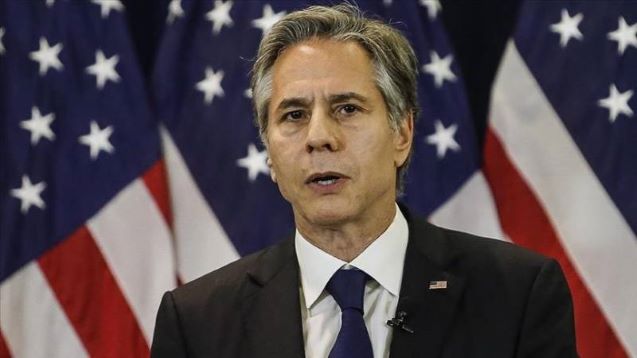BBC’s Tom Bateman Reports: Gaza’s two million people are experiencing “severe levels of acute food insecurity”, US Secretary of State Antony Blinken has said.
This was first time an entire population had been so classified, he said when questioned by the BBC about conditions in the territory.
Mr Blinken called on Israel to prioritise providing for those in need.
UN agencies have said north Gaza could face famine by May without a pause in the fighting and a surge in aid.
Mr Blinken’s warning came during a trip to the Philippines as US officials announced that he would travel to the Middle East, his sixth trip to the region since October, as efforts to secure a ceasefire continue.
Israeli negotiators are due to begin talks in Qatar on Tuesday in a fresh attempt to agree a deal with Hamas to halt the fighting, get humanitarian aid in, and Israeli hostages out.
Mr Blinken’s comments were among his strongest yet in setting out the scale of the humanitarian crisis in Gaza.
Asked by the BBC whether the current conditions were a harbinger of the territory’s future without an agreed governance or security plan, he said: “According to the most respected measure of these things, 100% of the population in Gaza is at severe levels of acute food insecurity. That’s the first time an entire population has been so classified.”
Acute food insecurity is when a person’s inability to consume adequate food puts their life or livelihood in immediate danger. If unaddressed, it leads to starvation.
Mr Blinken added: “We also see again, according to in this case the United Nations, 100% – the totality of the population – is in need of humanitarian assistance,” he added.
“Compare that to Sudan, about 80% of the population there is in need of humanitarian assistance; Afghanistan, about 70%. So, again, this only underscores both the urgency, the imperative, of making this the priority.”
He once again called on Hamas to lay down arms but said it was incumbent on Israel to make it a priority to provide for those who desperately needed humanitarian assistance.
Asked about the numbers of journalists killed in Gaza and lack of access to the territory for international reporters, Mr Blinken said that “as a matter of principle” journalists should have access wherever there is conflict so “the world can have knowledge”.
He said the issue was something “we bring up in every instance”.
Later, the UN human rights chief stressed that the catastrophic hunger in Gaza was “human-made and… entirely preventable”.
Volker Türk put the blame firmly on what he called Israel’s “extensive restrictions on the entry and distribution of humanitarian aid and commercial goods, displacement of most of the population, as well as the destruction of crucial civilian infrastructure”.
The restrictions, he warned, “may amount to the use of starvation as a method of war, which is a war crime”.
Israel’s diplomatic mission to the UN in Geneva said Mr Türk was seeking to blame it for the situation in Gaza and “completely absolve the responsibility of the UN and Hamas”.
“Israel is doing everything it can to flood Gaza with aid, including by land air and sea,” it insisted.
Aid workers reject this, saying that much of the problem in the northern Gaza is due to a collapse in security around aid convoys, after Israel targeted police who were escorting them.
Israel has said police have been hit because its military is dismantling Hamas. But the US has questioned this, saying such targeting makes aid distribution impossible and is counterproductive.
US officials also announced on Tuesday that Mr Blinken would make his latest trip to the region since Hamas’s attacks on Israel on 7 October and the start of the war in Gaza.
It comes without a breakthrough so far on a ceasefire for hostage-release deal between Israel and Hamas.
He will speak with Saudi leaders in Jeddah and then continue onto Cairo to meet the Egyptian leadership.
A significant part of the talks will focus on Arab support for a post-war plan to secure and govern Gaza.
The Americans want rule by the Palestinian Authority, the post-Oslo peace accords entity that lost control in Gaza to Hamas after elections and fighting 17 years ago.
But the Israeli Prime Minister Benjamin Netanyahu has repeatedly rejected the idea of PA rule there, one of many critical points of dispute over any so-called “day after plan” for Gaza.
Mr Blinken did not address a question about whether an agreed post-war plan for Gaza could only move forward with a different Israeli leader.
On Monday night, US President Joe Biden told Mr Netanyahu this his plan to push on with an offensive in Rafah would be a “mistake”, with more than a million Gazan civilians sheltering in the southern border town.
In their first conversation in over a month, they also discussed a plan to send an Israeli delegation to Washington next week to discuss both the Rafah plan and a new alternative approach to targeting Hamas there without a major ground invasion.__BBC-com





